League of Ireland return could carry serious risks - warns Covid-19 doctor
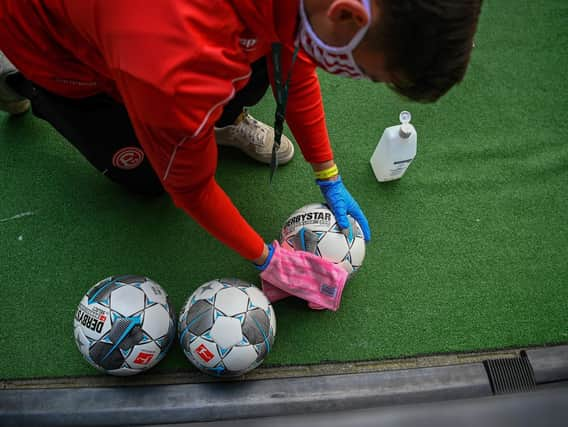

Dr. Nicola Herron, who worked occasionally as Derry City Football Club’s matchday doctor until 2017, is currently deployed at the Covid-19 assessment centre at Altnagelvin Hospital, and she stressed the potentially ‘critical’ dangers of returning to football too soon.
The Football Association of Ireland has announced its pathway for a ‘safer return to football’ and Medical Director of the association, Dr Alan Byrne, has stated the health and safety of all stakeholders is at the core of all FAI decisions.
Advertisement
Hide AdAdvertisement
Hide AdDerry City, Dundalk, Shamrock Rovers and Bohemians are permitted to return to collective training on June 8th with players and staff to undergo regular Covid-19 testing from May 26th.
And while the FAI is currently exploring medical protocols for training grounds and behind closed doors matches, Dr Herron is concerned the measures suggested may be premature and impractical for smaller clubs and are, ‘not feasible’ and ‘massively difficult to coordinate’ as she questions the urgency to return to playing matches.
One of those measures is mass testing of players, staff and officials either weekly or bi-weekly but the Derry GP claims coronavirus testing could offer ‘false reassurances’ as they are currently only 65% to 70% accurate with 48 hour delays on results.
In the absence of a successful vaccine or more accurate testing, Dr. Herron believes players and officials will be taking a significant risk if they resume playing football matches without adhering to social distancing guidelines on the pitch or finding a way for players to wear specially adapted personal protective equipment during games.
Advertisement
Hide AdAdvertisement
Hide AdThe burning concern for players is for their own safety, the safety of their families and anyone they come into contact with. And while a recent PFAI survey of 285 League of Ireland players showed 87% wanted to return to play, the Derry GP warned that playing high level sports while carrying the virus could increase the risk of cardiac conditions and potentially have life-changing or career ending impacts on footballers.
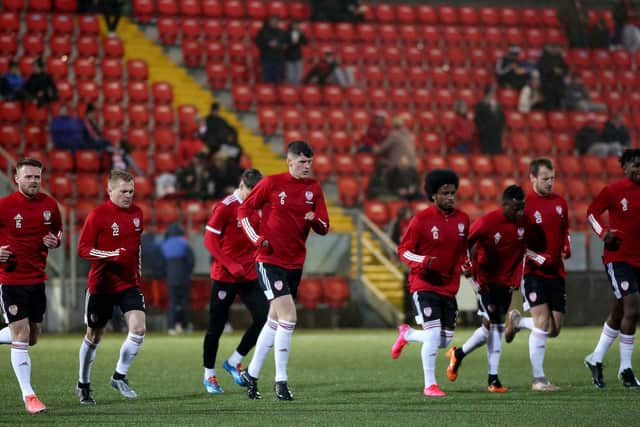

“Each player needs to ask themselves how much risk are you willing to live with? That’s what this boils down to,” said Dr Herron. “What we do know about the virus is that if someone plays sports at a high level and they are carrying the virus, that could increase their risk of heart or cardiac issues.
“There are a lot of unknowns about this virus and in small children certain vascular conditions are occurring more frequently than expected at the minute.
"These children haven’t presented with coronavirus symptoms but are presenting with these quite unusual and rare vascular conditions.
Advertisement
Hide AdAdvertisement
Hide Ad“One is called Kawasaki disease which causes inflammation of the blood vessels which supply the heart. Obviously that’s a grave concern.
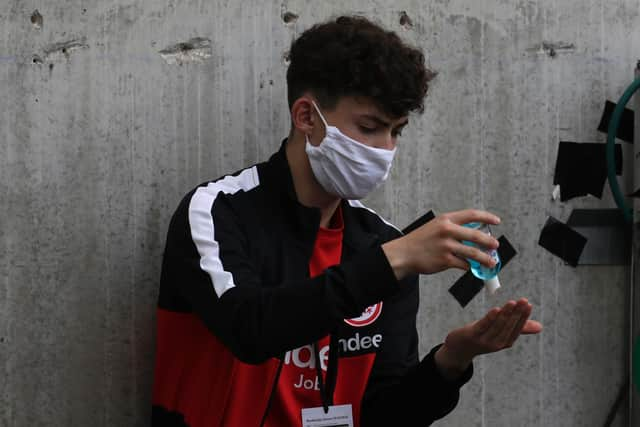

“If a footballer has coronavirus, has no symptoms whatsoever, and has a false negative test, is there the possibility that the circulation to his heart may be affected? Footballers are not in the usual age range for Kawasaki disease but the fact this virus could cause inflammation in the blood vessels around the heart raises the question, is there the possibility that it could cause vascular damage or inflammation in older people or young adults?
“It’s one of these big unknowns, it’s rare but can cause sudden death if you have something like that happening, especially if someone is putting their heart under pressure by training and playing football.
“We know the risk to a young adult is small compared to an elderly person or someone with an underlying health problem, e.g. diabetes, but because this virus causes inflammation in the lungs this can lead to scarring and fibrosis of the lungs. If a footballer gets this and gets sick with it, that could be the end of their career because their breathing may never be 100 percent again.
Advertisement
Hide AdAdvertisement
Hide Ad“They are in the lower risk group but the consequences if they do happen to get very sick with this could be life changing.”
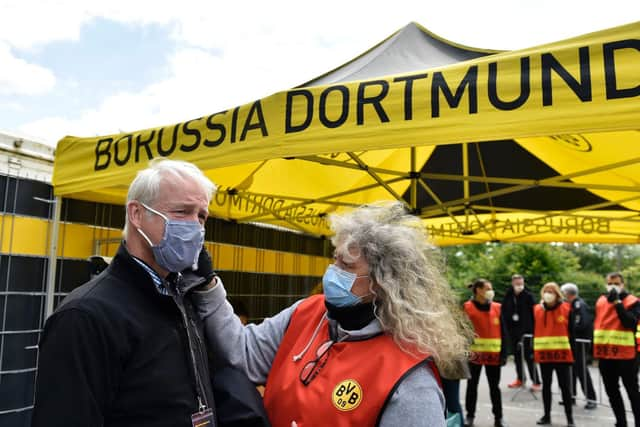

There has been reason for optimism for football fans as the German Bundesliga has already resumed behind closed doors while Italian Serie A teams returned to training yesterday (Monday) and the English Premiership and EFL have been given the official government green light to restart competitions in June.
However, Dr Herron doesn’t believe most League of Ireland clubs are currently well enough equipped to implement the necessary safety measures and feels this is unlikely to improve dramatically between now and July 20th without major financial investment and expertise.
“I think a date is very difficult. I suppose putting a date on it gives people something to work towards and organise themselves but it may be raising hope which will then be dashed if easing lock-down causes a second wave of the virus and everything would have to be cancelled again.
Advertisement
Hide AdAdvertisement
Hide Ad“We have to imagine the situation as regards the virus on July 20th may well be exactly the same as if we were planning to start playing football again next week. There’s nothing magic that’s going to happen between now and July 20th that will reduce risk.
“Unfortunately without testing we don’t know what our circulating level of this virus in the community is now. A huge testing and contact tracing programme needs to be rolled out so that we can continue to reduce the spread of the virus. Without a vaccine this really is the only way to ensure we are safe.”
Dr. Herron (right) believes the FAI is taking a risk by starting back now when there’s every possibility the community incidents of this virus could rise again once lockdown restrictions are eased.
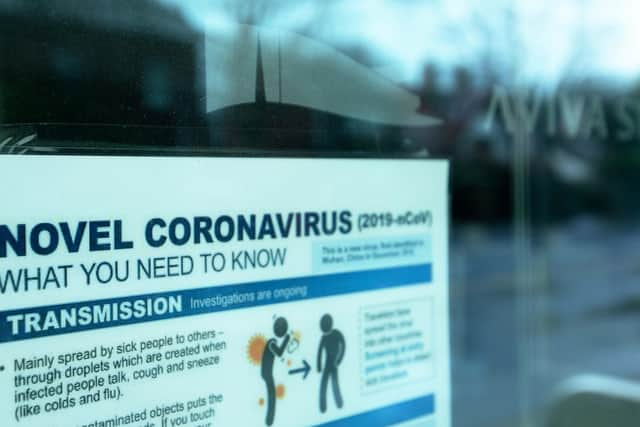

“As long as everyone understands that it may all need to be cancelled again if the situation changes,” she said. ”While we don’t know the circulating level of this virus in the community then we can’t know how likely one of the players, or their support team, are to have the virus.
Advertisement
Hide AdAdvertisement
Hide Ad”One of the difficulties is that, say a player on a team tests positive, then what happens? Does the rest of the team go into self isolation for two weeks?
"The difficulty is that once you get everything back in gear and up and running there are massive economic consequences to cancelling things.
“It’s a difficult enough situation when it’s all on hold as it is at the minute, but if you then go back into production again and suddenly it all has to stop because the manager has tested positive or a player has....that’s an issue.
“There’s so much to think about. There’s the ripple effect of one person testing positive and the next thing other teammates will have to be isolated and all his other contacts at home will have to be isolated. If a player has someone at home who is vulnerable that’s an even bigger issue.”
Advertisement
Hide AdAdvertisement
Hide Ad“The risk of an infected player passing on the virus to his team-mates or opponents is high. You can’t control a players’ movement on a pitch. There is some possibility of keeping social distance during training or normal daily activities but during a match there is no chance of that.
"If we add in the fact that during exercise someone who has this virus will be breathing out much bigger amounts of the virus than usual then this is an extra consideration and risk.”
Every measure will be taken to ensure everyone involved on matchday isn’t carrying the virus but even if clubs were to implement impeccable infection control, Dr Herron said tests must be carried out on the understanding it doesn’t compromise the testing of key workers.
“A big team with a huge budget could maybe bring in the kind of measures which would make this feasible,” she said. “But just how much testing and checking is a smaller football club like Derry City and other teams in the League of Ireland able to do to keep their players safe?” asked Dr. Herron.
Advertisement
Hide AdAdvertisement
Hide Ad“There are newer tests available now which can give a result in as little as four hours. Currently though these tests are not widely available and are kept for key members of medical staff or very ill patients in whom a diagnosis is needed quickly.
“These are the sort of tests that would make pre-match testing a feasible option. However unless the available number of these tests can be increased then using them for footballers would compromise their use in critical care.
“An issue with the current available tests is that they are not 100% sensitive. So of 10 people tested who have the virus, only six or seven will actually test positive. This results in three or four people who will think they are negative when they aren’t. This false reassurance is a worry if the result of the test decides whether or not you can play a football match.
“The other worry is the incubation period for this virus, i.e., you may be infectious for four or five days before you test positive. That is a problem when we are relying on a test to tell us how safe it is to be close to other people.
Advertisement
Hide AdAdvertisement
Hide Ad“I would hope that in two or three months time we would be in a much better position, testing-wise, and have a more effective test. We might also know if many people have developed immunity.
“There is a test for antibodies which is now being approved for general use. If a player has antibodies and is therefore immune, then that would be reassuring. This test will hopefully be available very soon.
“As you can see there are so many unknowns it is difficult to plan ahead. Will we be 10 steps forward or 10 steps back by July? That’s the risk when you start to ease the lockdown and people start to gather again generally. We may see a surge in the number of cases.
“At the minute, because we’re not testing the population we just don’t know what our baseline is. And because we don’t have a good antibody test we don’t know how many people are immune. So there are a lot of big gaps in our knowledge at the minute.
Advertisement
Hide AdAdvertisement
Hide Ad“The virus hasn’t changed. Our ability to treat it hasn’t changed. Ideally if 1,000 people in Derry were tested tomorrow and say one in 1,000 are found to have the virus then the risk is low, is it worth taking the chance? Possibly. You’re not that likely to run into someone who is carrying it. But if it’s say 50 or 60 in 1,000, suddenly that’s quite a lot and most of these people don’t even know they have it.
“There’s just frustratingly so many unknowns it’s impossible to give clear direction as to how to get back to playing football safely.”
While the Bundesliga returned at the weekend, Dr. Herron believes the sport must learn to adapt to a ‘new normal’, think outside the box and perhaps change its format if it’s to successfully make a successful return during the ongoing Covid-19 crisis.
“Can anyone imagine a football match where you’re maintaining a two metres distance? It would be a very different game, one where tackling doesn’t happen, where interception becomes the new way of playing. I’m trying to visualise that but it would be a very different game. It may be what we’re going to have to do.
Advertisement
Hide AdAdvertisement
Hide Ad“If this virus turns out to be as stubborn as it appears to be, we may have to look at changing the game somewhat so that close physical contact cannot happen.
“As regards bringing spectators back into the grounds ... it’s maybe possible to bring people in to a stadium observing social distancing rules but over the course of a match people need to use toilets, expect to be able to get refreshments. It’s really difficult to see how this can work safely without huge changes.
“The virus is testing our patience as much as anything else. We know that if there’s an effective vaccine then hopefully this time next year we could be in a much better position where we can say as long as you have had the vaccine you’re safe to go and play, you’re safe to go and watch.
“Are we jumping the gun and risking things because we are impatient? Everybody is yearning to get back to normal but we need to start thinking about being adaptable now. We need to adapt everything we do. This is critical for us to keep ourselves and each other safe.
Advertisement
Hide AdAdvertisement
Hide Ad“If another virus comes along in three years time we will be back to square one if we haven’t learned how to adapt to this one.”
As someone who has been involved as a matchday doctor for the Candy Stripes, what safety measures does Dr Herron recommend which would reduce the risk for footballers?
“It’s keeping a safe distance which is the issue in team sports. The main instruction is to keep at least two metres apart from other people. How do you apply that in a game of football?
“When we are going closer than two metres to a patient at work, we wear plastic aprons, scrubs, mask, gloves and a visor, we use alcohol gel on our hands and wash them frequently, we ask the patient we are seeing to wear a mask. When they leave we take everything off really carefully and wash our hands using alcohol gel again.
Advertisement
Hide AdAdvertisement
Hide Ad“So if getting close to a person who may be infected entails that level of protection how do you apply that during a match? We need to figure out a way of adapting to this virus in a way that leaves us with a game that’s still enjoyable to watch and play but keeps players safe. This would mean that the game and the players are protected now and in the event of any further pandemics in the future.”
Declan Devine recently suggested Brandywell Stadium would be ideal for a north west hub should the league opt to use only three or four venues to host all matches. And Dr Herron reckons it would certainly help reduce the risk of infection.
“After a match every player would need to have a separate shower and changing area to use before they go home. Having one or two well equipped stadiums in the country would probably make it possible to apply social distancing of the players and personnel and ensure really good cleaning of the facility, toilets, showers, changing facilities, all of that.
“The difficulty on the pitch is that every player is frequently going to be less than two metres away from other players, so is going to need to be protected.
Advertisement
Hide AdAdvertisement
Hide Ad“I wonder if some kind of personal protection equipment would be possible on the pitch,” she suggested. “This currently sounds ridiculous, but ice-hockey players and American footballers wear head and face protection. How much safer would that make it? We would need to ask an infection control expert, there’s no easy answer but we do need to find an answer.”
Dr Herron, who deals daily with patients who either have coronavirus or are suspected cases, believes that social distancing guidance can’t change until our ability to prevent or treat the virus has changed.
“I know it’s frustrating and it feels like forever but this is temporary. We will come through this and we will get a vaccine. When that’s rolled out we will have a population which is resilient to this. Then we can get back to some sort of normality.
“In terms of football, my first concern is that people are kept safe. If there are two or three stadiums in Ireland that have particularly good facilities and are well staffed this would certainly make safeguarding easier. Financially it would be very difficult for every club to fulfil the rigorous new standards that will be required.
Advertisement
Hide AdAdvertisement
Hide Ad“Once we know that the level of circulating virus in the community is negligible we will be able to say that team sports and public gatherings are relatively safe.
“The people of Derry have been incredible throughout this pandemic. Their support for each other has been an inspiration. We love our football team and want them to be back playing as soon as possible, but we also love them enough to want every single player and every member of the backroom staff to be safe when this happens.
“Continuing to keep safe social distancing and washing hands frequently is how every single one of us will help to bring the rate of this virus down to the level where the Brandywell Stadium can welcome its players and, in time, its famous supporters back into the terraces!”
Comment Guidelines
National World encourages reader discussion on our stories. User feedback, insights and back-and-forth exchanges add a rich layer of context to reporting. Please review our Community Guidelines before commenting.